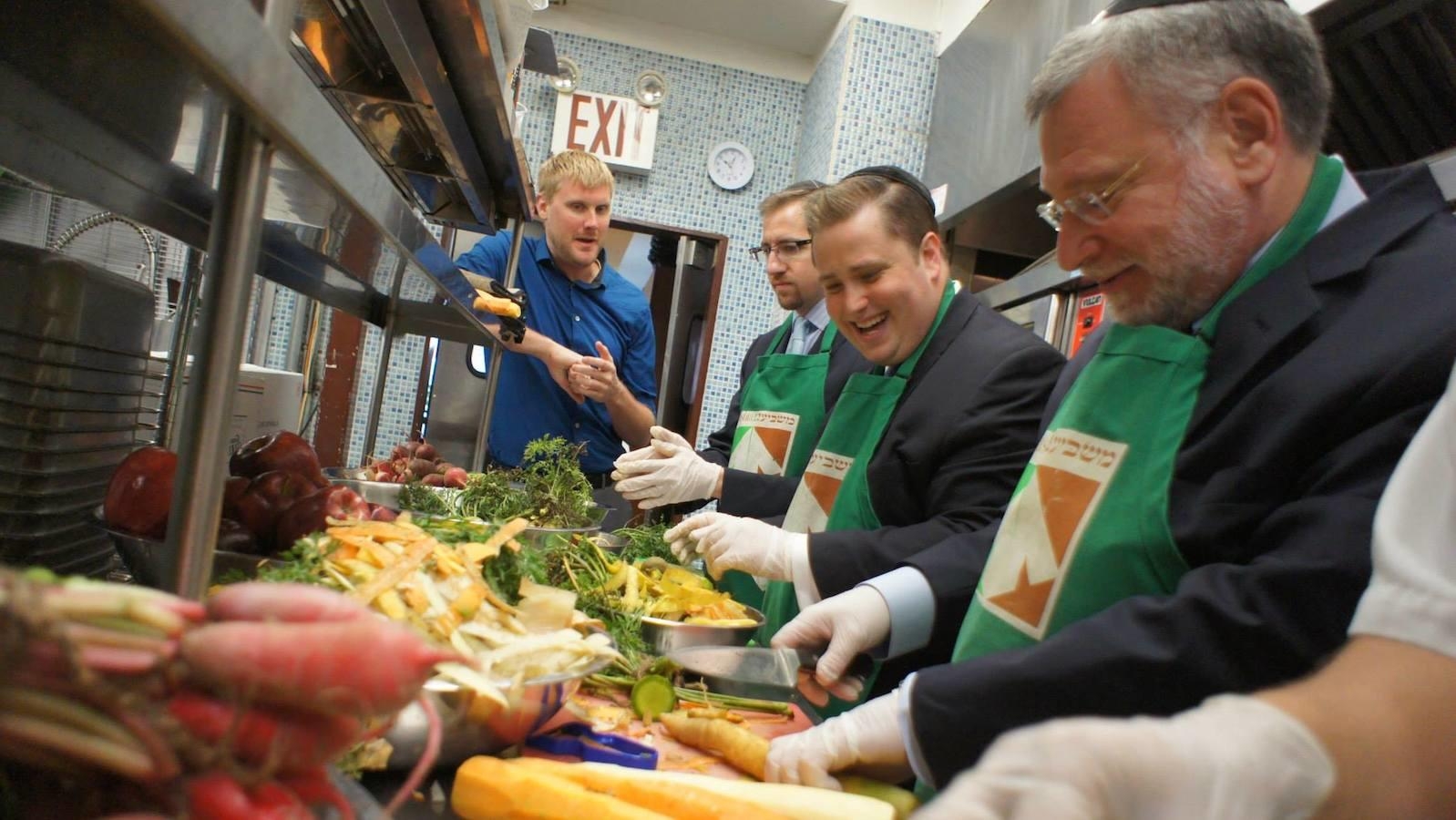Question: What’s the name of the rabbi who blesses the food in a kosher restaurant?
–Jason, Seattle
Answer: Actually, Jason, in Judaism we never bless food, even though sometimes that might be what it looks like we’re doing. Though we do say blessings before and after eating, we are actually blessing God for allowing us to experience good, sustaining food–not blessing the foodstuff itself.
Okay, so now that we’ve got that covered, I have another bubble to burst for you — the rabbi at a kosher restaurant is not there to say any kind of blessing, and he (or she, though most commonly he) is not always a rabbi. He’s called a mashgiach, which means supervisor or overseer, and he’s present in the kitchen of a kosher establishment to ensure that everything that goes on there is, well, kosher.
In America, as in most Western countries, if you want to open a restaurant or start a company that makes some kind of food product, you need to have various government officials come check out the facility where you make and package the food. They’re looking at a few different things: What are you putting in your food? Is the food safe to eat? Are you being honest about what ingredients are in your product? Are your workers safe? Is the facility sanitary? All of this comes down to a desire to protect consumers from sickness, and a secondary desire to ensure that the workers in the facility are also safe.
With your help, My Jewish Learning can provide endless opportunities for learning, connection and discovery.
Observant Jews believe that eating non-kosher food is spiritually unsafe. It won’t give you the kind of food poisoning that will leave you throwing up for days, but it could “damage” your soul. The observant Jewish community also harbors a deep respect for Jewish law, and a desire to honor the obligation to uphold Jewish legal standards about kashrut. So, just like governments have set up departments that are responsible for ensuring food safety, observant Jewish communities have set up organizations that take responsibility for ensuring that food in kosher restaurants really is kosher.
What does this mean, on a practical level? I asked Rabbi Dov Schreier, director of food service and rabbinic coordinator at the Orthodox Union (the largest organization that does hashgacha, or supervision, of kosher restaurants and food products), what a mashgiach actually does. He said, “A mashgiach’s job is to check all the products, check all the vegetables… and monitor everything that comes in and out of the kitchen.” Basically, he’s checking for anything that might deem the food unkosher. That could be an unkosher ingredient, such as lard, or gelatin, or a bug that hasn’t been washed off of a piece of lettuce.
What happens when a mashgiach finds something non-kosher in a place he is overseeing? If it is something simple, like a bug on a piece of lettuce, he can simply wash the bug off. If it is a greater issue, like a non-kosher ingredient being used, or dairy equipment being used to cook meat, the mashgiach will call his supervisor to discuss all the Jewish legal issues at play, and see if something can be done to make the food permissible. According to Rabbi Schreier, “If in fact the matter needs immediate attention, corrective action will need to be taken depending on [the] severity of [the] issue.”
Unlike the government, which has one organization (the Food and Drug Administration) with one set of rules to do all of the checking, the Jewish community has many different groups that offer hashgacha services.
There are national groups, like the Orthodox Union, local groups, like the Chicago Rabbinical Council, and individuals who supervise one or a handful of restaurants or facilities. Each group is a little different, with slightly different standards and interpretations of the laws of kashrut, and different fees for services. Some facilities have a mashgiach who is always present in the kitchen, and in many cases the mashgiach is in fact the person who literally holds the key to the kitchen, in order to ensure that he knows exactly what comes in and goes out. This is most common in restaurants, cafeterias, and nursing homes. In large factories where a single product is constantly being produced over and over again, there are mashgichim (plural for mashgiach) who come and visit the facility every once in a while, performing surprise inspections to make sure that the standards of kashrut are being maintained.
So how does one go about becoming a mashgiach? Jewish law demands that a mashgiach be someone with impeccable moral and ethical standing in the community. Because the hashgacha business is private, a mashgiach (or the organization he or she works for) is paid by the restaurants he certifies, and this can create a conflict of interest if a mashgiach finds something unkosher and must decide whether to report it. For this and many other reasons, it’s extra important that a mashgiach hold himself to the highest standards of honesty.
Many, if not most mashgichim are rabbis, but that is not a prerequisite. The most basic requirements are that the person be Jewish, and knowledgeable about the laws of kashrut. The person should also observe Shabbat according to halacha, or Jewish law; personally observe the laws of kashrut and generally be an observant Jew.
In the past few years, a new kind of “mashgiach” has also emerged on the market. There are now two organizations in America, and one in Israel, devoted to ensuring that workers at kosher restaurants, and plants where kosher food is made and manufactured, are treated with respect, paid fairly, and given a safe space in which to do their jobs.
These organizations employ “mashgichim” who checks standards other than kashrut. They give certification, just like a kashrut organization, but if a company fails an inspection the food is not deemed unkosher. Instead, a failed inspection may serve as an ethical deterrent to members of the Jewish community who want to be sure to patronize only businesses that treat their workers fairly and responsibly.
Next time you see a mashgiach heading back into the kitchen at a kosher restaurant say hi — and tell him or her thanks for keeping the bugs out of your salad!
kashrut
Pronounced: kahsh-ROOT, Origin: Hebrew, the Jewish dietary laws.
kosher
Pronounced: KOH-sher, Origin: Hebrew, adhering to kashrut, the traditional Jewish dietary laws.
mashgiach
Pronounced: mahshGHEEahkh, Origin: Hebrew, a kashrut supervisor, someone who ensures that a product or restaurant can be certified as kosher.



